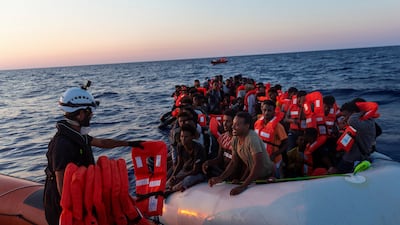European border agency Frontex is the subject of a fresh investigation following human rights concerns about its co-operation with Libya.
Activists say Frontex failed to consider human rights risks before offering training and lending surveillance equipment to other countries.
The European Union helps Libya to train border guards under an €85 million ($83m) project to keep Mediterranean migration in check.
But the EU agency has been dogged by claims that it is funding abuses by Libyan coast guards.
After a complaint by six human rights groups, an EU ombudsman has opened an inquiry into two aspects of Frontex’s co-operation with Libya.
Border guards have been ordered to explain whether human rights risks were assessed before training was provided on law enforcement at sea.
Documents on one training exercise that were attached to the complaint did not include any such risk assessment, said the ombudsman, Emily O’Reilly.
She also asked Frontex whether similar risks were considered in aerial surveillance of the Mediterranean together with Libya.
The UN and its refugee agency UNHCR have described “terrible and systematic abuse” at Libyan-run detention facilities for asylum seekers.
EU migration chief Ylva Johansson said in April that she expected Libya to bring an end to inhumane conditions in detention centres.
Berenice Gaudin of Sea Watch, one of the groups that filed a complaint, said: “Our message is clear: we are watching and we will continue to fight Frontex’s border practices through all possible legal ways.”
“For the past years, we have been witnessing Frontex’s inhumane co-operation with the so-called Libyan Coast Guard which led to illegal pullbacks of thousands of individuals to Libya,” she added.
About 38,000 people have crossed the Mediterranean from Libya to the coast of Italy this year. Most of those arriving in Europe are not Libyan but originally from countries such as Tunisia, Egypt or Bangladesh.
Another four lines of inquiry by the ombudsman concern Frontex’s collaboration with non-EU countries generally.
The agency was told to pass on any concerns raised about its missions with Niger and Bosnia-Herzegovina.
The EU’s diplomatic corps, the European External Action Service, is also under Ms O’Reilly’s microscope over similar concerns.
It was asked to hand over copies of internal reports on its civilian missions in Libya, Somalia, Niger, Mali, Palestine and Iraq.
The EU ombudsman opened a separate inquiry last year into Frontex’s work helping African countries to develop surveillance capabilities.
The agency also faced allegations that it was involved in so-called “pushbacks” at sea while patrolling Greece’s waters.


